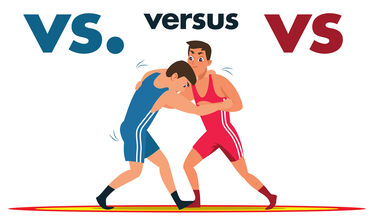Writing versus is a comparison between two things that sometimes elicits an emotional response from the reader. It typically highlights differences between the two items and is used to persuade readers to make their own opinions about which one is better. Writing versus can be done in various ways depending on what you are trying to say.

Table Of Content:
- versus, v., vs. – Writing Tips Plus – Writing Tools – Resources of the ...
- Versus Definition & Meaning - Merriam-Webster
- versus, v., vs. - Search for entries starting with V - Writing Tips ...
- Is vs. or vs the Correct Abbreviation Format?
- “Versus” - Quick and Dirty Tips ™
- Active Versus Passive Voice // Purdue Writing Lab
- Writing Tip 427: “Vs” / “Vs.” / “V.” (How to punctuate the abbreviation ...
- Versus and Its Abbreviations
- What faculty write versus what students see? Perspectives on ...
- abbreviations - How should I abbreviate "versus"? - English ...
1. versus, v., vs. – Writing Tips Plus – Writing Tools – Resources of the ...
https://www.noslangues-ourlanguages.gc.ca/en/writing-tips-plus/versus-vs
2. Versus Definition & Meaning - Merriam-Webster
https://www.merriam-webster.com/dictionary/versus
3. versus, v., vs. - Search for entries starting with V - Writing Tips ...
https://www.btb.termiumplus.gc.ca/tpv2guides/guides/wrtps/index-eng.html?lang=eng&lettr=indx_catlog_v&page=9GZGCGS05v7g.html
4. Is vs. or vs the Correct Abbreviation Format?
https://abbreviations.yourdictionary.com/is-vs-or-vs-the-correct-abbreviation-format.html
5. “Versus” - Quick and Dirty Tips ™
https://www.quickanddirtytips.com/articles/versus/
6. Active Versus Passive Voice // Purdue Writing Lab
https://owl.purdue.edu/owl/general_writing/academic_writing/active_and_passive_voice/active_versus_passive_voice.html
7. Writing Tip 427: “Vs” / “Vs.” / “V.” (How to punctuate the abbreviation ...
https://kris-spisak.com/how-to-punctuate-the-abbreviation-of-versus/
8. Versus and Its Abbreviations
https://www.dailywritingtips.com/versus-and-its-abbreviations/
9. What faculty write versus what students see? Perspectives on ...
https://pubmed.ncbi.nlm.nih.gov/33590781/
10. abbreviations - How should I abbreviate "versus"? - English ...
https://english.stackexchange.com/questions/5392/how-should-i-abbreviate-versusSep 10, 2015 ... In legal contexts, the abbreviation "v." is used. Elsewhere, the most common is "vs.". In formal contexts (e.g. scientific papers), ...
What are some tips for writing a good versus?
First, identify what it is you want to compare and contrast, then write down your thoughts and feelings on each item. Remember to focus on the facts as well as your emotions. Additionally, make sure your point of view is clearly stated throughout the piece and back up your argument with evidence wherever possible. Lastly, use strong language that evokes emotion in the reader to help them make an informed conclusion.
When would I use a versus?
A versus can be used whenever you have two topics or items that you want to compare with each other - either positively or negatively. It might be used in an academic essay, advertising campaign, or even just an informal discussion amongst friends.
How do I structure my writing for maximum effectiveness?
Structure your writing by introducing both sides of the argument before moving into a deeper dive of each item separately (or together). Be sure to also include counterarguments so that readers can acknowledge both valid points of view and come away with a well-rounded perspective on the items being compared. Finally, end with a clear conclusion about which item you believe is superior, why this stands true, and what potential implications it holds for readers.
How long should my writing be?
The length of your writing will depend on which type of medium it’s intended for (short blog post vs essay) but generally speaking should not exceed more than 1-2 pages if possible (unless it’s an academic paper). In any case, try to keep it concise while still providing enough evidence/examples needed to back up your argument persuasively.
How do I avoid bias when writing versus?
Bias can easily creep into our writings if we're not careful; however there are some steps we can take to reduce it as much as possible such as using factual evidence whenever possible instead of opinions or personal experiences (which could evoke confirmation bias). Additionally, strive for balance by thoroughly researching both sides of the argument prior - so that you know all potential factors at play - before making a judgment call about which one is better or worse than another.
Conclusion:
. [END]
Q:When would I use a versus?
A: A versus can be used whenever you have two topics or items that you want to compare with each other - either positively or negatively. It might be used in an academic essay, advertising campaign, or even just an informal discussion amongst friends. [END]
Q:How do I structure my writing for maximum effectiveness?
A: Structure your writing by introducing both sides of the argument before moving into a deeper dive of each item separately (or together). Be sure to also include counterarguments so that readers can acknowledge both valid points of view and come away with a well-rounded perspective on the items being compared. Finally, end with a clear conclusion about which item you believe is superior, why this stands true, and what potential implications it holds for readers. [END]
Q: How long should my writing be?
A: The length of your writing will depend on which type of medium it’s intended for (short blog post vs essay) but generally speaking should not exceed more than 1-2 pages if possible (unless it’s an academic paper). In any case, try to keep it concise while still providing enough evidence/examples needed to back up your argument persuasively. [END]
Q: How do I avoid bias when writing versus?
A: Bias can easily creep into our writings if we're not careful; however there are some steps we can take to reduce it as much as possible such as using factual evidence whenever possible instead of opinions or personal experiences (which could evoke confirmation bias). Additionally, strive for balance by thoroughly researching both sides of the argument prior - so that you know all potential factors at play - before making a judgment call about which one is better or worse than another. [END]
Conclusion Writing strong versus can require considerable effort but when done properly will help bring out important information from each side while creating meaningful arguments backed up with facts and reliable sources - resulting in an effective comparison piece that gives readers an informed opinion on whichever topic was discussed!
